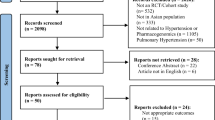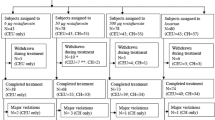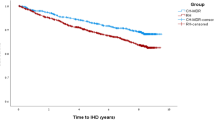Abstract
In a double-blind, outcome trial conducted in hypertensive patients randomized to chlorthalidone (C), amlodipine (A), lisinopril (L), or doxazosin (D), the α-adducin Gly460Trp polymorphism was typed (n=36 913). Mean follow-up was 4.9 years. Relative risks (RRs) of chlorthalidone versus other treatments were compared between genotypes (Gly/Gly+Gly/Trp versus Trp/Trp). Primary outcome was coronary heart disease (CHD). Coronary heart disease incidence did not differ among treatments or genotypes nor was there any interaction between treatment and genotype (P=0.660). Subgroup analyses indicated that Trp allele carriers had greater CHD risk with C versus A+L in women (RR=1.31) but not men (RR=0.91) with no RR gender differences for non-carriers (gender–gene–treatment interaction, P=0.002). The α-adducin gene is not an important modifier of antihypertensive treatment on cardiovascular risk, but women Trp allele carriers may have increased CHD risk if treated with C versus A or L. This must be confirmed to have implications for hypertension treatment.
This is a preview of subscription content, access via your institution
Access options
Subscribe to this journal
Receive 6 print issues and online access
$259.00 per year
only $43.17 per issue
Buy this article
- Purchase on Springer Link
- Instant access to full article PDF
Prices may be subject to local taxes which are calculated during checkout




Similar content being viewed by others
References
Glover MJ, Greenlund KT, Ayala C, Croft JB . Racial/ethnic disparities in prevalence, treatment, and control of hypertension – United States, 1999–2002. MMWR 2005; 54: 7–9.
Schwartz GL, Turner ST . Pharmacogenetics of antihypertensive drug responses. Am J Pharmacogenomics 2004; 4: 151–160.
Kurland L, Liljedahl U, Karlsson J, Kahan T, Malmqvist K, Melhus H et al. Angiotensinogen gene polymorphisms: relationship to blood pressure response to antihypertensive treatment. Results from the Swedish Irbesartan Left Ventricular Hypertrophy Investigation vs Atenolol (SILVHIA) trial. Am J Hypertens 2004; 17: 8–13.
Katsuya T, Iwashima Y, Sugimoto K, Motone M, Asai T, Fukuda M et al. Effects of antihypertensive drugs and gene variants in the renin–angiotensin system. Hypertens Res 2001; 24: 463–467.
Sciarrone MT, Stella P, Barlassina C, Manunta P, Lanzani C, Bianchi G et al. ACE and alpha-adducin polymorphism as markers of individual response to diuretic therapy. Hypertension 2003; 41: 398–403.
Cadman PE, O'Connor DT . Pharmacogenomics of hypertension. Curr Opin Nephrol Hypertens 2003; 12: 61–70.
Cusi D, Barlassina C, Azzani T, Casari G, Citterio L, Devoto M et al. Polymorphisms of alpha-adducin and salt sensitivity in patients with essential hypertension. Lancet 1997; 349: 1353–1357.
Castellano M, Barlassina C, Muiesan ML, Beschi M, Cinelli A, Rossi F et al. Alpha-adducing gene polymorphism and cardiovascular phenotypes in a general population. J Hypertens 1997; 15: 1707–1710.
Kato N, Sugiyama T, Nabika T, Morita H, Kurihara H, Yazaki Y et al. Lack of association between the alpha-adducin locus and essential hypertension in the Japanese population. Hypertension 1998; 31: 730–733.
Wang WY, Adams DJ, Glenn CL, Morris BJ . The Gly460Trp variant of alpha-adducin is not associated with hypertension in white Anglo-Australians. Am J Hypertens 1999; 12: 632–636.
Schork NJ, Chakravarti A, Thiel B, Fornage M, Jacob HJ, Cai R et al. Lack of association between a biallelic polymorphism in the adducin gene and blood pressure in whites and African Americans. Am J Hypertens 2000; 13: 693–698.
Province MA, Arnett DK, Hunt SC, Leiendecker-Foster C, Eckfeldt JH, Oberman A et al. Association between the alpha-adducin gene and hypertension in the HyperGEN Study. Am J Hypertens 2000; 13: 710–718.
Davis BR, Cutler JA, Gordon DJ, Furberg CD, Wright Jr JT, Cushman WC et al. Rationale and design for the Antihypertensive and Lipid Lowering Treatment to Prevent Heart Attack Trial (ALLHAT). ALLHAT Research Group. Am J Hypertens 1996; 9: 342–360.
Arnett DK, Boerwinkle E, Davis BR, Eckfeldt J, Ford CE, Black H . Pharmacogenetic approaches to hypertension therapy: design and rationale for the Genetics of Hypertension Associated Treatment (GenHAT) study. Pharmacogenomics J 2002; 2: 309–317.
The ALLHAT Officers and Coordinators for the ALLHAT Collaborative Research Group. Major cardiovascular events in hypertensive patients randomized to doxazosin vs chlorthalidone: the antihypertensive and lipid-lowering treatment to prevent heart attack trial (ALLHAT). JAMA 2000; 283: 1967–1975.
The ALLHAT Officers and Coordinators for the ALLHAT Collaborative Research Group. Major outcomes in high-risk hypertensive patients randomized to angiotensin-converting enzyme inhibitor or calcium channel blocker vs diuretic. The Antihypertensive and Lipid-Lowering Treatment to Prevent Heart Attack Trial (ALLHAT). JAMA 2002; 288: 2981–2997.
Special Emphasis Panel. Report of the special emphasis panel on opportunities and obstacles to genetic research in NHLBI clinical studies. In: National Heart, Lung, and Blood Institute, National Institutes of Health 1997.
Morrison AC, Bray MS, Folsom AR, Boerwinkle E . ADD1 460W allele associated with cardiovascular disease in hypertensive individuals. Hypertension 2002; 39: 1053–1057.
Nicod J, Frey BM, Frey FJ, Ferrari P . Role of the alpha-adducin genotype on renal disease progression. Kidney Int 2002; 61: 1270–1275.
Perron L, Bairati I, Harel F, Meyer F . Antihypertensive drug use and the risk of prostate cancer (Canada). Cancer Causes Control 2004; 15: 535–541.
Tahmatzopoulos A, Rowland RG, Kyprianou N . The role of alpha-blockers in the management of prostate cancer. Expert Opin Pharmacother 2004; 5: 1279–1285.
Psaty BM, Smith NL, Heckbert SR, Vos HL, Lemaitre RN, Reiner AP et al. Diuretic therapy, the alpha-adducin gene variant, and the risk of myocardial infarction or stroke in persons with treated hypertension. JAMA 2002; 287: 1680–1689.
Turner ST, Chapman AB, Schwartz GL, Boerwinkle E . Effects of endothelial nitric oxide synthase, alpha-adducin, and other candidate gene polymorphisms on blood pressure response to hydrochlorothiazide. Am J Hypertens 2003; 16: 834–839.
Schelleman H, Stricker BH, Verschuren WM, de Boer A, Kroon AA, de Leeuw PW et al. Interactions between five candidate genes and antihypertensive drug therapy on blood pressure. Pharmacogenomics J 2006; 6: 22–26.
Glorioso N, Manunta P, Filigheddu F, Troffa C, Stella P, Barlassina C et al. The role of alpha-adducin polymorphism in blood pressure and sodium handling regulation may not be excluded by a negative association study. Hypertension 1999; 34: 649–654.
Naber CK, Siffert W . Genetics of human arterial hypertension. Minerva Med 2004; 95: 347–356.
Bianchi G, Tripodi MG, Casari G, Salardi S, Barber BR, Garcia R et al. Two point mutations within the adducin genes are involved in blood pressure variation. Proc Natl Acad Sci USA 1994; 91: 3999–4003.
Wang JG, Staessen JA, Barlassina C, Fagard R, Kuznetsova T, Stuijker-Boudier HA et al. Association between hypertension and variation in the alpha- and beta-adducin genes in a white population. Kidney Int 2002; 62: 2152–2159.
Staessen JA, Wang JG, Brand E, Barlassina C, Birkenhager WH, Herrmann SM et al. Effects of three candidate genes on prevalence and incidence of hypertension in a Caucasian population. J Hypertens 2001; 19: 1349–1358.
Grant FD, Romero JR, Jeunemaitre X, Hunt SC, Hopkins PN, Hollenberg NH et al. Low-renin hypertension, altered sodium homeostasis, and an alpha-adducin polymorphism. Hypertension 2002; 39: 191–196.
Glorioso N, Filigheddu F, Cusi D, Troffa C, Conti M, Natalizio M et al. Alpha-adducin 460Trp allele is associated with erythrocyte Na transport in North Sardinian primary hypertensives. Hypertension 2002; 39: 357–362.
Wang JG, Liu L, Zagato L, Xie J, Fagard R, Jin K et al. Blood pressure in relation to three candidate genes in a Chinese population. J Hypertens 2004; 22: 937–944.
Ferrandi M, Salardi S, Tripodi MG, Barassi P, Rivera R, Manunta P et al. Evidence for an interaction between adducin and Na-K-ATPase: relation to genetic hypertension. Am J Physiol 1999; 277: H1338–H1349.
Tripodi MG, Valtorta F, Torielli L, Chieregatti E, Salardi S, Trusolino L et al. Hypertension associated point mutations in the adducin alpha and beta subunits affect actin cytoskeleton and ion transport. J Clin Invest 1996; 97: 2815–2822.
Bianchi G, Ferrari P, Staessen JA . Adducin polymorphism detection and impact on hypertension. Hypertension 2005; 45: 331–340.
Manunta P, Cusi D, Barlassina C, Righetti M, Lanzani C, D'Amico M et al. Alpha-adducin polymorphisms and renal sodium handling in essential hypertensive patients. Kidney Int 1998; 53: 1471–1478.
Manunta P, Burnier M, D'Amico M, Buzzi L, Maillard M, Barlassina C et al. Adducin polymorphism affects renal proximal tubule reabsorption in hypertension. Hypertension 1999; 33: 694–697.
Staessen JA, Wang J, Bianchi G, Birkenhäger WH . Essential hypertension. Lancet 2003; 361: 1629–1641.
Yamagishi K, Iso H, Tanigawa T, Cui R, Kudo M, Shimamoto T . Alpha-adducin G460W polymorphism, urinary sodium excretion, and blood pressure in community-based samples. Am J Hypertens 2004; 17: 385–390.
Wang JG, Staessen JA, Barlassina C, Fagard R, Kuznetsova T, Struijker-Boudier HA et al. Association between hypertension and variation in the α- and β-adducin genes in a white population. Kidney Int 2002; 62: 2152–2159.
Schwartz GL, Turner ST, Chapman AB, Boerwinkle E . Interacting effects of gender and genotype on blood pressure response to hydrochlorothiazide. Kidney Int 2002; 62: 1718–1723.
Bachman J, Feldmer M, Ganten U et al. Sexual dimorphism of blood pressure: possible role of the rennin–angiotensin system. J Steroid Biochem Mol Biol 1991; 40: 511–515.
Davis BR, Ford CE, Boerwinkle E, Arnett D, Eckfeldt J, Black H . Imputing gene–treatment interactions when the genotype distribution is unknown using case-only and putative placebo analyses – a new method for the Genetics of Hypertension Associated Treatment (GenHAT) study. Stat Med 2004; 23: 2413–2427.
SHEP Cooperative Research Group. Prevention of stroke by antihypertensive drug treatment in older persons with isolated systolic hypertension. Final results of the Systolic Hypertension in the Elderly Program (SHEP). JAMA 1991; 265: 3255–3264.
Kostis JB, Davis BR, Cutler J, Grimm Jr RH, Berge KG, Cohen JD et al. Prevention of heart failure by antihypertensive drug treatment in older persons with isolated systolic hypertension. SHEP Cooperative Research Group. JAMA 1997; 278: 212–216.
Author information
Authors and Affiliations
Corresponding author
Additional information
Duality of interest
None declared.
Rights and permissions
About this article
Cite this article
Davis, B., Arnett, D., Boerwinkle, E. et al. Antihypertensive therapy, the α-adducin polymorphism, and cardiovascular disease in high-risk hypertensive persons: the Genetics of Hypertension-Associated Treatment Study. Pharmacogenomics J 7, 112–122 (2007). https://doi.org/10.1038/sj.tpj.6500395
Received:
Revised:
Accepted:
Published:
Issue Date:
DOI: https://doi.org/10.1038/sj.tpj.6500395
Keywords
This article is cited by
-
Hypertension pharmacogenomics: in search of personalized treatment approaches
Nature Reviews Nephrology (2016)
-
Why do hypertensive patients of African ancestry respond better to calciumblockers and diuretics than to ACE inhibitors and β-adrenergic blockers? Asystematic review
BMC Medicine (2013)
-
Renin–Angiotensin System and α-Adducin Gene Polymorphisms and Their Relation to Responses to Antihypertensive Drugs: Results From the GENRES Study
American Journal of Hypertension (2009)
-
Recruitment of participants through community pharmacies for a pharmacogenetic study of antihypertensive drug treatment
Pharmacy World & Science (2009)
-
Pharmacogenetics of the response to antihypertensive drugs
Current Cardiovascular Risk Reports (2009)



